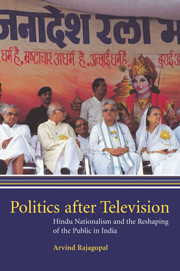Crossref Citations
This Book has been
cited by the following publications. This list is generated based on data provided by Crossref.
Rajagopal, Arvind
1998.
Advertising, Politics and the Sentimental Education of the Indian Consumer.
Visual Anthropology Review,
Vol. 14,
Issue. 2,
p.
14.
Fernandes, Leela
2000.
Nationalizing `the global': media images, cultural politics and the middle class in India.
Media, Culture & Society,
Vol. 22,
Issue. 5,
p.
611.
Shukla, Sandhya
2001.
Locations for South Asian Diasporas.
Annual Review of Anthropology,
Vol. 30,
Issue. 1,
p.
551.
2001.
Books Received.
Current Anthropology,
Vol. 42,
Issue. 4,
p.
584.
Zacharias, Usha
2001.
Trial by Fire.
Social Text,
Vol. 19,
Issue. 4,
p.
29.
Manchanda, Rita
2002.
Militarised Hindu nationalism and the mass media: Shaping aHindutvapublic discourse.
South Asia: Journal of South Asian Studies,
Vol. 25,
Issue. 3,
p.
301.
Jeffrey, Robin
2002.
Communications and capitalism in India, 1750–2010.
South Asia: Journal of South Asian Studies,
Vol. 25,
Issue. 2,
p.
61.
Veer, Peter van der
2002.
Religion in South Asia.
Annual Review of Anthropology,
Vol. 31,
Issue. 1,
p.
173.
Friedland, Roger
2002.
Money, Sex, and God: The Erotic Logic of Religious Nationalism.
Sociological Theory,
Vol. 20,
Issue. 3,
p.
381.
Cullity, Jocelyn
2002.
The Global Desi: Cultural Nationalism on Mtv India.
Journal of Communication Inquiry,
Vol. 26,
Issue. 4,
p.
408.
Jeffrey, Robin
2002.
Grand Canyon, Shaky bridge: Media revolution and the rise of ‘Hindu’ politics.
South Asia: Journal of South Asian Studies,
Vol. 25,
Issue. 3,
p.
281.
Drzewiecka, Jolanta A.
2002.
Reinventing and contesting identities in constitutive discourses: Between diaspora and its others.
Communication Quarterly,
Vol. 50,
Issue. 1,
p.
1.
Thussu, Daya Kishan
2002.
Managing the Media in an Era of Round-the-Clock News: notes from India's first tele-war.
Journalism Studies,
Vol. 3,
Issue. 2,
p.
203.
Geertz, Clifford
2002.
An Inconstant Profession: The Anthropological Life in Interesting Times.
Annual Review of Anthropology,
Vol. 31,
Issue. 1,
p.
1.
2003.
Shoveling Smoke.
p.
149.
2003.
Shoveling Smoke.
p.
3.
2003.
Shoveling Smoke.
p.
331.
2003.
Shoveling Smoke.
p.
250.
2003.
Shoveling Smoke.
p.
289.
2003.
Shoveling Smoke.
p.
37.





